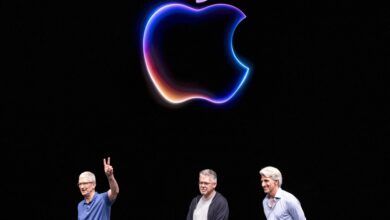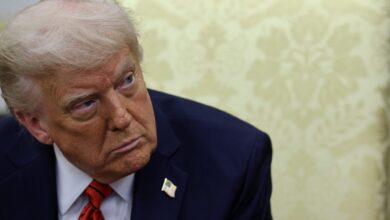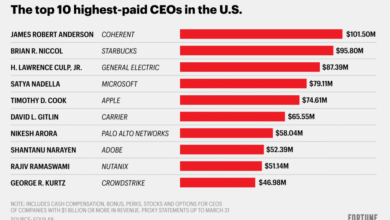Jamie Dimon concerned Trump tariffs will leave the U.S. out in the cold: ‘America First is fine, as long as it doesn’t end up being America alone’


- JPMorgan Chase CEO Jamie Dimon warned in his annual shareholder letter that President Trump’s sweeping tariff policy could raise inflation and increase the risk of a recession, though his deeper concern lies in the potential long-term damage to America’s alliances with key military and trade partners.
JPMorgan Chase CEO Jamie Dimon is becoming increasingly concerned by President Donald Trump’s tariff policy.
The white knight of Wall Street has now echoed other top banking leaders and warned that the White House’s recent action would likely prove inflationary and could tip the economy into a recession.
However, Dimon, who has led the world’s largest bank for nearly 20 years, said his key concern isn’t short-term economic pain but how America will maintain relationships with key military and trading partners.
When President Trump announced the sweeping economic sanctions on April 2 he made it clear that “friend and foe” were being treated alike, with major allies such as the EU facing hikes of 20%.
While world leaders expressed their outrage with the tariff policy, their immediate response was to pledge negotiation with the Oval Office. Whether their proposals will be enough to satisfy the Trump administration and bring their tariff rate down remains to be seen.
In his letter to shareholders this year, Dimon wrote the tariffs “will likely increase inflation and are causing many to consider a greater probability of a recession … These significant and somewhat unprecedented forces cause us to remain very cautious.”
But he added: “My most serious concern is how this will affect America’s long-term economic alliances.”
Europe, in particular, Dimon has frequently highlighted as a hotbed of geopolitical tension as a result of Ukraine’s war with Russia.
This hasn’t been aided by President Trump’s recent—and very public—spat with Ukraine’s prime minister Volodymyr Zelenskyy.
That being said, Trump is far from pleased with President Putin, saying last month that he is “very angry” and “pissed off” with the Russian premier.
“Keeping our alliances together, both militarily and economically, is essential,” Dimon wrote in the letter released today. “The opposite is precisely what our adversaries want.”
The banker who was paid $39 million for his work in 2024 wrote that the EU is far from perfect, nodding to President Trump’s key concern that European nations are not spending enough on their military capabilities.
But Dimon added: “This is going to be hard, but our country’s goal should be to help make European nations stronger and keep them close. If Europe’s economic weakness leads to fragmentation, the landscape will look a lot like the world before World War II.
“Each nation will need to seek out its own relationships to secure its future, and that may very well mean closer relationships with Russia and Iran for energy and China for trade and economics.”
He added that these moves, over time, would increase dependency on China and Russia, essentially turning Uncle Sam’s former allies into “vassal states” for its rivals.
“Economics is the longtime glue, and America First is fine, as long as it doesn’t end up being America alone,” Dimon added.
JPMorgan recently raised recession expectations from 40% to 60%
In the gamut of opinions on Trump’s tariff policy, Dimon has, so far, held a fairly balanced outlook.
He initially said the policy could prove a little inflationary but could ultimately prove good for national security, in which case people need to “get over it.”
Dimon has long advocated weaning Uncle Sam off its dependency on other nations, particularly when it comes to national security. In his letter to shareholders last year, he wrote that “the United States cannot rely on any potential adversaries for materials essential to our national security.”
That said, Dimon added, the ultimate benefits of achieving greater American independence will come with some pain.
“Whatever you think of the legitimate reasons for the newly announced tariffs—and, of course, there are some—or the long-term effect, good or bad, there are likely to be important short-term effects,” Dimon, 69, added.
“As for the short-term, we are likely to see inflationary outcomes, not only on imported goods but on domestic prices, as input costs rise and demand increases on domestic products.
“How this plays out on different products will partially depend on their substitutability and price elasticity. Whether or not the menu of tariffs causes a recession remains in question, but it will slow down growth.”
JPMorgan recently raised its recession expectation from 40% to 60%, following similar action from Goldman Sachs.
“There are many uncertainties surrounding the new tariff policy: the potential retaliatory actions, including on services, by other countries, the effect on confidence, the impact on investments and capital flows, the effect on corporate profits and the possible effect on the U.S. dollar,” Dimon added.
“The quicker this issue is resolved, the better because some of the negative effects increase cumulatively over time and would be hard to reverse. In the short run, I see this as one large additional straw on the camel’s back.
“I am hoping that after negotiations, the long-term effect will have some positive benefits for the United States.”
This story was originally featured on Fortune.com
https://fortune.com/img-assets/wp-content/uploads/2025/04/GettyImages-2204125419-e1744034651107.jpg?resize=1200,600
2025-04-07 14:17:23





